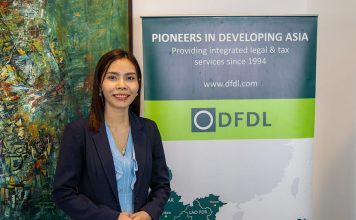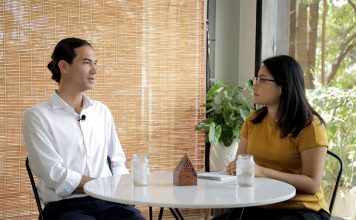
“Phnom Penh is an emerging city with lots of real estate potential,” says Terry Blackburn, the managing director of awards and publications at PropertyGuru and founder of the Cambodian Property Awards. “There is so much heritage architecture here. It’s very encouraging to invest in the city right now.”
Blackburn’s words reflect the buoyant feeling that permeates Cambodia’s real estate sector. Both commercial and residential properties are currently experiencing a boom: office buildings and condos keep attracting huge amounts of money into the country; meanwhile, the capital readies itself for the completion of some elite retail developments, which will open their doors before the end of the year. Potential for growth in this relatively small and young market is huge.
On the down side, the sector has witnessed a number of unfinished developments in the last few years, a clear sign that the market is still immature and that some developers and investors lack a thorough understanding of it, or are unwilling to conduct proper research. The condo market also shows signs of instability, with developers building large condo projects primarily as investment vehicles rather than to meet local demand.
The office market
Historically, investment in high-end office space in the capital has been relatively small, with investors favouring modified villas and renovated shophouses. However, the success of Canadia Tower, followed by the construction of Phnom Penh Tower, has emboldened developers to invest in office space projects. “The Cambodian economy continues to expand and is no longer ignored by international firms,” says David Murphy, Managing Director of IPS Cambodia.
The office segment in Phnom Penh continues to grow at a fast pace, largely due to the Kingdom’s relatively open economy and the ease of doing business here. International firms, seeing how their products and services gain popularity in the Kingdom, are now opening offices in the capital and establishing a permanent presence. Murphy predicts this welcomed trend will continue throughout 2016 and beyond, as the Cambodian market continues to be targeted by companies that find themselves struggling in more mature, traditional markets. “Previously there has been limited quality office stock and this is now changing,” asserts James Padden, Surveyor at CBRE Cambodia.
According to Padden, the market now has a clear segmentation with Grade A space satisfying the demand of multinational corporations for top level specification, environmental and safety concerns. Grade B space offers quality, efficient offices at a mid-range price. Finally, there are the lower grade buildings; these many not be able to check the box for top quality, but they do offer space at a competitive cost. They are ideal for back office functions or start-up companies on a lower budget.
Exchange Square is scheduled for completion by the last quarter of the year and has been garnering strong interest in Phnom Penh as well as regionally. It is only the second Grade A building to grace the capital, after Vattanac Capital, which was completed in 2014. According to Blackburn, several high-end and luxury condo developments, such as Olympia City and the Taiwanese backed TK Royal One, will have office space as well.
The upward trend is likely to continue in the foreseeable future, particularly with the move towards ASEAN integration luring companies within Southeast Asia to expand regionally for the first time and venture out of their home markets.
Condos & serviced apartments
The condo market in Phnom Penh has been growing exponentially in recent years and continues to do so to this day. However, most of the investors in this segment of the market come from overseas, a fact that raises concerns over the real value of some of these properties; in the words of Thida Ann, Senior Associate Director at CBRE Cambodia: “Most of the buyers are overseas speculators seeking capital growth.”
Like Ann, Murphy is of the mind that a lot of the purchases in the condo sector are made as investments by buyers that don’t intend to occupy the acquired premises. According to him, we are likely to witness a significant spike in available medium to high-end units coming onto the rental market over the next three years, partly brought about by the sort of speculative behaviour mentioned above. The problem is that, to attract tenants, owners are reducing rental rates of new condo units, which will likely lead to lower capital growth. “Lower rental yields coupled with continued supply spikes will have a negative effect on capital growth on these units,” he notes.
Ann believes the condo segment is still not tailored to the needs of the local population, with prices going beyond what’s affordable for middle-class Khmers. In this regard, she advises developers to “target their client first before commencing development”, adding that “affordable products are the right type of property for the Cambodian market.”
With continued supply in the condo and serviced apartment market, Murphy thinks the most favourable outlook in the residential sector is in the renovated apartment sector. “We see first hand the ongoing demand for apartments with western facilities and Indochine character. The demand for these types of properties is currently greater than the supply,” says Murphy. Unfortunately, condo developers are not taking note of this demand, and not many units of this kind are being built. Investors looking for renovated, mid-priced unique units can take advantage of ongoing opportunities in the districts of Daun Penh, Tonle Bassac, Boeung Keng Kang 2 and 3, and 7 Makara.
Developments of note
There are plenty of new residential projects setting the bar high in Phnom Penh. Investors are excited about the Grand Star Platinum, a modern housing project from the Borey Peng Houth Group, as well as two high-rise condo developments from Urbanland, Embassy Residences and Embassy Central. The Suncity Bassac Residential Development has also attracted significant attention.
Olympia City, a mixed-use project developed by the Overseas Cambodia Investment Corporation, will include residential, retail and commercial spaces. The project is creating great anticipation among local and foreign customers.
This year will see the completion of the Exchange Square, Hongkong Land’s flagship mixed-use project, comprising 13,000 sqm of retail and 16 floors of Grade A office space. The building will open in November and is already seeing strong demand from multinational corporations and other smaller firms.
The development of alternative areas
Real estate reports have highlighted an increase in prime residential developments located in some of Phnom Penh’s non-traditional, secondary areas, such as Chroy Chang Va and Sen Sok. High land prices and limited space availability in the Central Business District (CBD) are two of the reasons developers are looking out for alternative areas.
As pointed out by CBRE’s Ann, other factors that may be driving the trend are the plentiful availability of development space in these alternative areas, as well as their easy accessibility and reasonable land prices. Moreover, the expansion of the city and the accompanying infrastructure development favor the development of secondary areas, in detriment of more traditional ones.
Murphy believes demand from middle to high-income Khmers is driving the change. In his opinion, this is a great demographic to focus on, as they tend to be owner-occupiers. He also gives us an insider tip: “I personally believe the borey concept and the low level, mid-priced condo are the right products for these emerging suburbs,” he says.
Would-be investors are increasingly looking outside the capital, and targeting the emerging real estate markets of cities like Siem Reap and Sihanoukville. These two hubs are now being serviced by boutique airlines, helping to introduce these locations to potential property buyers.
Future of the market
Some real estate professionals, like Murphy, predict a cool down in the development momentum in the coming years. This is only natural, as the market cannot indefinitely sustain the fast-paced growth it has experienced in the last decade.
“All property markets are cyclical,” says Blackburn, “and Cambodia is no exception.” The man behind the Cambodia Property Awards, which took place this year for the first time, says he expects to see a lot of growth in the next 3 to 5 years. “Maybe it will slow down in a few years, but there will certainly be a new wave of developments after that,” he concludes.








